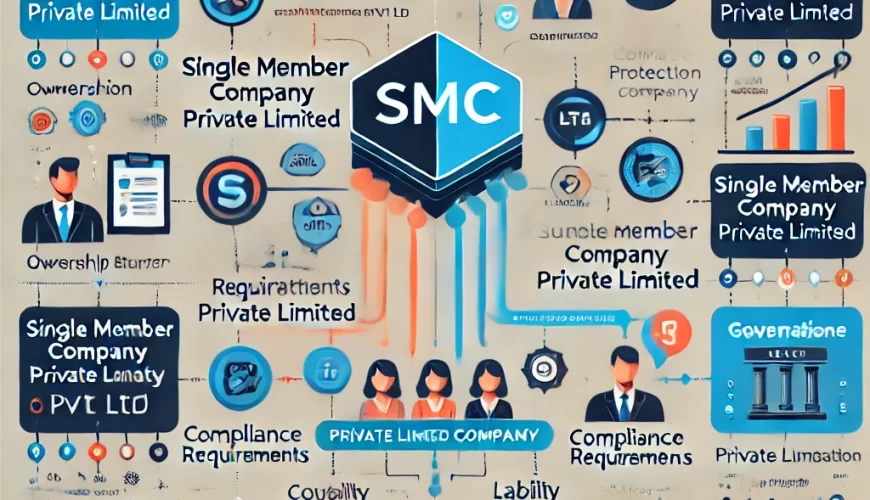Small and Medium Enterprises (SMEs) serve as the backbone of economies worldwide. Within this sector, two popular corporate structures in many jurisdictions, including Pakistan and other countries with similar business environments, are Single Member Companies (SMC Pvt Ltd) and Private Limited Companies (Pvt Ltd). Choosing the right corporate structure is critical for entrepreneurs as it directly affects their liability, taxation, governance, and operational flexibility. This article aims to provide an in-depth analysis of SMC Pvt Ltd and Pvt Ltd, comparing their legal structures, advantages, limitations, and suitability for different types of businesses.
Understanding SMC Pvt Ltd
An SMC Pvt Ltd, or Single Member Company Private Limited, is a relatively new concept introduced in many jurisdictions to facilitate single-owner businesses. The primary purpose of this structure is to offer limited liability to a sole proprietor, transforming sole proprietorships into a more formalized corporate entity.
Key Features of SMC Pvt Ltd
- Single Ownership: An SMC Pvt Ltd can be established by a single individual who acts as the sole shareholder and director of the company.
- Separate Legal Entity: It enjoys a distinct legal identity separate from its owner, allowing it to own assets, incur liabilities, and enter into contracts.
- Limited Liability: The owner’s liability is limited to the extent of their investment in the company.
- Conversion Flexibility: It can be converted into a regular Pvt Ltd company if additional shareholders are added in the future.
- Regulatory Compliance: While lighter than Pvt Ltd, it still requires adherence to corporate governance standards, filing of annual returns, and auditing in some jurisdictions.
Advantages of SMC Pvt Ltd
- Simplicity in Management: With a single owner, decision-making is streamlined, and there is no need for complex management structures.
- Limited Liability Protection: The owner’s personal assets are protected from the company’s liabilities.
- Tax Benefits: In some countries, SMCs benefit from preferential tax treatments compared to sole proprietorships or partnerships.
- Ease of Formation: The process of setting up an SMC Pvt Ltd is typically faster and less bureaucratic.
- Flexibility for Growth: It offers flexibility to scale and invite new shareholders without changing the corporate structure entirely.
Limitations of SMC Pvt Ltd
- Perception of Limited Scale: SMCs might be perceived as less credible compared to larger Pvt Ltd companies.
- Regulatory Overheads: Although reduced, the compliance requirements can still be significant for small businesses.
- Limited Capital Raising Options: With a single owner, there are fewer avenues for raising equity capital compared to Pvt Ltd.
Understanding Pvt Ltd
A Pvt Ltd, or Private Limited Company, is one of the most common corporate structures for businesses seeking limited liability and a robust governance framework. It is ideal for businesses involving multiple owners and is well-suited for scaling and attracting investments.
Key Features of Pvt Ltd
- Multiple Shareholders: A Pvt Ltd company can have multiple shareholders, with the exact number capped (e.g., 50 in Pakistan).
- Separate Legal Entity: Like SMCs, Pvt Ltd companies enjoy a distinct legal identity.
- Limited Liability: The liability of shareholders is limited to their shareholding in the company.
- Corporate Governance: Pvt Ltd companies must adhere to stricter governance requirements, including appointing a board of directors.
- Restricted Share Transferability: Shares cannot be freely traded on stock exchanges, maintaining the “private” nature of the company.
Advantages of Pvt Ltd
- Credibility and Trust: Pvt Ltd companies are generally considered more credible by customers, investors, and financial institutions.
- Capital Raising Potential: They can attract equity investments and venture capital, making them suitable for growth-oriented businesses.
- Professional Management: The involvement of multiple shareholders often leads to a more structured management approach.
- Perpetual Existence: The company’s existence is not tied to the lives of its shareholders.
- Ownership Distribution: Shareholding can be distributed among family members, employees, or external investors.
Limitations of Pvt Ltd
- Stricter Compliance Requirements: Pvt Ltd companies are subject to rigorous reporting and auditing standards.
- Higher Cost of Formation and Maintenance: Setting up and running a Pvt Ltd company involves more expenses compared to SMC Pvt Ltd or sole proprietorships.
- Limited Shareholder Numbers: The cap on the number of shareholders restricts its scalability compared to public companies.
- Restricted Share Liquidity: Shares cannot be traded on public markets, potentially limiting liquidity for shareholders.
Comparative Analysis of SMC Pvt Ltd and Pvt Ltd
1. Ownership Structure
- SMC Pvt Ltd: Owned and managed by a single individual.
- Pvt Ltd: Owned by multiple shareholders, with a maximum limit.
2. Legal Identity
Both structures enjoy separate legal identities, providing limited liability protection to their owners.
3. Capital Requirements
- SMC Pvt Ltd: Generally requires lower capital, making it accessible to small-scale entrepreneurs.
- Pvt Ltd: Higher capital requirements but offers better avenues for raising funds.
4. Compliance and Reporting
- SMC Pvt Ltd: Simplified compliance requirements but still involves statutory filings.
- Pvt Ltd: Stricter compliance norms, including mandatory audits and board meetings.
5. Scalability
- SMC Pvt Ltd: Limited scalability due to single ownership but can convert to Pvt Ltd if needed.
- Pvt Ltd: Highly scalable, with the ability to add more shareholders and raise capital.
6. Taxation
Taxation policies often vary by jurisdiction. In some cases, SMCs enjoy preferential tax rates, but this is not universal.
7. Governance
- SMC Pvt Ltd: Single-owner management makes governance straightforward.
- Pvt Ltd: Requires a formal board of directors and adherence to corporate governance principles.
8. Perception and Credibility
- SMC Pvt Ltd: May be viewed as less robust compared to Pvt Ltd.
- Pvt Ltd: Generally seen as a more professional and reliable corporate structure.
Which Structure Should You Choose?
SMC Pvt Ltd is Ideal for:
- Sole proprietors looking to transition to a corporate structure.
- Small businesses with limited capital and simpler operations.
- Entrepreneurs seeking limited liability without involving additional shareholders.
Pvt Ltd is Ideal for:
- Businesses aiming for rapid growth and scalability.
- Companies planning to raise capital from investors.
- Ventures requiring structured governance and credibility.
Conclusion
The choice between SMC Pvt Ltd and Pvt Ltd depends on the specific needs, scale, and vision of the business. SMC Pvt Ltd is a perfect stepping stone for sole proprietors seeking the benefits of incorporation while maintaining simplicity. On the other hand, Pvt Ltd offers a comprehensive structure for businesses with multiple stakeholders and ambitious growth plans.
Understanding the nuances of each structure and aligning them with your business objectives is crucial. Consulting with legal and financial advisors can further help in making an informed decision. Ultimately, the right choice will pave the way for sustainable growth, operational efficiency, and long-term success.


